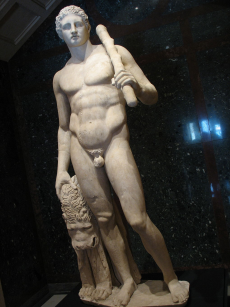
Rudyard Kipling (1865-1936) was one of the most prominent writers of the late nineteenth and early twentieth century. Today he is best known for having written The Jungle Book, a collection of short stories which went on to shape the outlook of the Scouting movement, set up by Robert Baden-Powell. However, he also remains a towering figure in the world of poetry and, for me at least, “If” is a prime example of why he is considered such a great poet.
Today, the subject of masculinity is one that is being increasingly discussed on chat shows, in newspapers and on the web. Often the discussion revolves around how society “constructs” masculinity and what effect those constructions then have on the world. Many feminists, for example, critique certain traditional forms of masculinity, forms which say that men must be domineering, aggressive and the masters of their household. However, in Kipling’s “If-”, which was written for his son, a rather different and more complex idea of what a man should be is presented.
The poem, as suggested by the title, is written entirely in the conditional tense, and comprises of a series of conditions, starting “If you can”, which if the son is able to live up to, he will be a true man. In essence, it is Kipling’s way of saying to his son what he considers to be important characteristics for a man to have. He starts the poem saying, “If you can keep your head when all about you/ Are losing theirs and blaming it on you”, suggesting that a man is someone who remains in control of himself in a tough situation, even when others are saying that it is your fault. Along the same lines, he adds, “If you can trust yourself when all men doubt you,/ but make allowance for their doubting too”, suggesting that whilst, as a man, one should not be too arrogant to listen to the council of others, one should have the courage to have confidence in your instincts and do what you think is right.
The second stanza, which focuses on more abstract matters, arguably contains one of the best clauses of the poem. Kipling writes, “If you can meet with Triumph and Disaster/ And treat those two imposters just the same”. Contrary to what one might expect, he doesn’t suggest that to be a man his son must be successful and triumph in everything he tries at. Instead, in personifying triumph and disaster by capitalising their first letters and calling them “imposters”, he suggests that he take neither into his heart when he meets with them – he clearly believes there are higher things a man should base himself on than success and failure.
In the third stanza, Kipling talks further about having the courage to accept defeat, but he also says, “If you can force your heart and nerve and sinew/ To serve your turn long after you are gone”, using the anatomy of the body metaphorically to imply that during his life his son should try to make a positive mark on society and therefore be remembered as someone who changed society for the good. And along the similar lines, in the last stanza he says to his son, “If you fill the unforgiving minute / With sixty seconds’ worth of distance run”, reminding him that time waits for no man, it does not forgive us, grant us time back, when we waste it being idle, and that therefore he must always do something iwith the time he has.
Kipling then ends the poem by saying that if he, his son, can do these things which he has mentioned “Yours is the Earth and everything that’s in it, / And – which is more – you’ll be a man my son!”
Image: By http://flickr.com/photos/maveric2003/ (http://www.flickr.com/photos/pss/3637104088//) [CC BY 2.0 (http://creativecommons.org/licenses/by/2.0)], via Wikimedia Commons

0 Comment:
Be the first one to comment on this article.